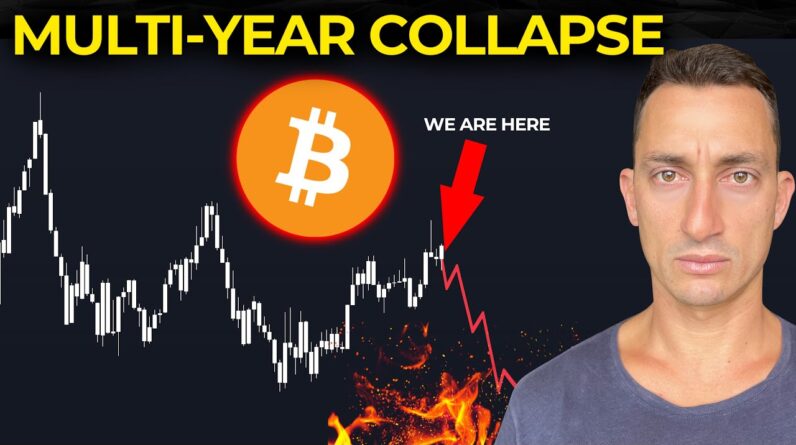
Are you concerned about the Bitcoin breakout as the SP500 crashes and recession fears rise? With the 18-year cycle and fluctuations in the USD, the future of Bitcoin seems uncertain. In this blog post, we will delve into the potential risks and analyze the current market trends to provide you with a better understanding of the situation. Get ready to explore the impact of the SP500 crash and rising recession fears on the Bitcoin breakout, and discover whether it’s at risk. So, strap in and let’s find out the implications for you and your Bitcoin investments.
Is The Bitcoin Breakout At Risk with SP500 Crashing and Rising Recession Fears? 18 Year Cycle, USD
Introduction:
In the world of cryptocurrency, Bitcoin has been making waves with its recent breakout. However, with the S&P 500 crashing and recession fears on the rise, many are questioning whether Bitcoin’s journey to the top is at risk. In this article, we will delve into the relationship between Bitcoin, the S&P 500, and the rising recession fears. We will also take a closer look at the 18-year cycle and the impact of the USD on Bitcoin’s performance.
Heading 1: The Relationship Between Bitcoin and the S&P 500
Bitcoin and the S&P 500 are often seen as two separate entities. However, there has been a growing correlation between the two in recent years. As the S&P 500 crashed, Bitcoin also experienced a decline in value. This can be attributed to the overall market sentiment and investor confidence. When the stock market is unstable, investors tend to flock to safe-haven assets, which can negatively impact the value of Bitcoin.
Subheading 1.1: Safe-Haven Asset Status
One of the reasons why Bitcoin is often considered a safe-haven asset is its decentralized nature. It is not tied to any government or central authority, which means it is less susceptible to economic and political instability. However, this status can be affected by external factors such as the performance of the S&P 500. In times of economic downturns and recession fears, investors may choose to liquidate their Bitcoin holdings to cover losses in the stock market, leading to a decline in Bitcoin’s value.
Subheading 1.2: Investor Sentiment
Investor sentiment plays a crucial role in the relationship between Bitcoin and the S&P 500. When there is a general sense of fear and uncertainty in the stock market, investors may lose confidence in the overall economy, leading to a decrease in the demand for riskier assets like Bitcoin. Conversely, when investor sentiment is positive and the stock market is performing well, the demand for Bitcoin may increase as investors seek higher returns.
Heading 2: The 18-Year Cycle
The 18-year cycle is an interesting phenomenon in the world of finance. It refers to the theory that major economic crises and market crashes occur roughly every 18 years. This cycle has been observed throughout history, with notable examples including the Great Depression in 1929 and the financial crisis of 2008. Many believe that we are currently approaching the end of another 18-year cycle, which could potentially impact the performance of Bitcoin and the S&P 500.
Subheading 2.1: The Impact on Bitcoin
If the 18-year cycle theory holds true, we could see a significant impact on the price of Bitcoin. During times of economic turmoil, investors tend to seek alternative investments, including cryptocurrencies. This surge in demand could drive up the price of Bitcoin, making it an attractive option for investors looking to protect their wealth. Additionally, as more people become aware of the potential benefits of cryptocurrencies during a financial crisis, Bitcoin’s popularity and adoption could increase.
Subheading 2.2: The Impact on the S&P 500
The S&P 500 is a broad indicator of the overall health of the U.S. stock market. If the 18-year cycle theory proves accurate, we could see a decline in the value of the S&P 500, similar to what happened during previous economic crises. This could have a ripple effect on other markets, including the cryptocurrency market. However, it is important to note that the 18-year cycle is not a guaranteed predictor of market behavior, and other factors could come into play.
Conclusion:
In conclusion, the relationship between Bitcoin, the S&P 500, and the rising recession fears is complex and multifaceted. While there is a growing correlation between Bitcoin and the S&P 500, their relationship is also influenced by investor sentiment, the safe-haven asset status of Bitcoin, and external factors such as the 18-year cycle. As the S&P 500 crashes and recession fears rise, the performance of Bitcoin may be at risk. It is crucial for investors to stay informed, monitor market trends, and make decisions based on their own risk tolerance and investment goals.
FAQs:
-
Can Bitcoin be considered a safe-haven asset?
Yes, Bitcoin is often considered a safe-haven asset due to its decentralized nature and independence from traditional financial systems. However, its status can be influenced by market conditions and investor sentiment. -
What is the 18-year cycle theory?
The 18-year cycle theory suggests that major economic crises and market crashes occur roughly every 18 years. This theory is based on historical data and has been observed in previous financial crises. -
How does investor sentiment affect the relationship between Bitcoin and the S&P 500?
Investor sentiment plays a crucial role in determining the demand for both Bitcoin and the S&P 500. In times of economic uncertainty, investors may choose to liquidate their Bitcoin holdings, leading to a decline in its value. -
Are there other factors that could impact the price of Bitcoin and the S&P 500?
Yes, there are numerous factors that can influence the price of Bitcoin and the S&P 500, including geopolitical events, regulatory developments, technological advancements, and overall market sentiment. -
Should I invest in Bitcoin during a recession?
Investing in Bitcoin during a recession can be risky, as the value of cryptocurrencies can be volatile. It is important to carefully consider your risk tolerance and investment goals before making any investment decisions.
